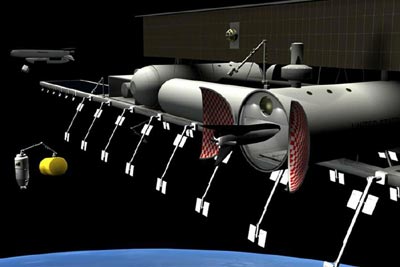|
|
 What policy shifts are needed by the next administration to put the US on the path to being a “true spacefaring nation”? (credit: M. Snead) |
What to tell the next president about realizing America’s potential in space
by Mike Snead
Monday, February 4, 2008
The start of the new presidential administration in 2009 will be a critical time for America’s non-military space efforts. The Vision for Space Exploration (VSE) has pronounced Bush Administration fingerprints and may not have the public support needed to weather the upcoming political debate on its future. More importantly, as the presidential debate shifts from foreign affairs to the domestic economy, no presidential candidate has yet seized on the potential of America’s industrial future in space as a key economic and technological catalyst for reestablishing America’s competitiveness and world leadership, and substantially helping America to become energy independent. American political leaders apparently remain blind to the true potential of space in the coming decades of the 21st century and do not yet publicly recognize that a new race for space industrialization is starting among the world’s technological nations.
The clear importance of space to America’s future is summarized in the current US National Space Policy: “In this new century, those who effectively utilize space will enjoy added prosperity and security and will hold a substantial advantage over those who do not. Freedom of action in space is as important to the United States as air power and sea power. In order to increase knowledge, discovery, economic prosperity, and to enhance the national security, the United States must have robust, effective, and efficient space capabilities.”
The Eisenhower Center for Space and Defense Studies, associated with the United States Air Force Academy, conducts public forums to discuss issues of importance to America’s future in space. This past fall, for example, they hosted a conference on Space-Based Solar Power (SBSP) at which the results of the informal SBSP study, sponsored by the National Security Space Office, were presented.
On February 7–8, the Center will hold this year’s National Space Forum, “Space Challenges Facing the New American Administration of 2009.” The focus of the opening panel, including Ambassador Roger Harrison, Director of the Eisenhower Center; and General C. Robert Kehler, Commander, US Air Force Space Command, will address the “key decisions that will need to be made in regard to space policy when a new American Administration comes to power in 2009.” The panel members will respond to questions about military, commercial, and civil space provided by the moderator and forum participants.
| American political leaders apparently remain blind to the true potential of space in the coming decades of the 21st century and do not yet publicly recognize that a new race for space industrialization is starting among the world’s technological nations. |
As this presidential campaign unfolds, it is up to the American pro-space industrialization community to proactively identify and communicate the importance of space to the candidates. Our responsibility is to provide the next president with a substantially improved understanding of the true potential of space industrialization and what new initiatives can and should be pursued. The upcoming National Space Forum is an excellent opportunity to advance this critical discussion. Given the opportunity, I would ask the opening panel participants these three questions:
1. Has a new strategic race for space started between the world’s leading nations to gain the knowledge, discovery, economic prosperity, and national security advantages that true spacefaring nations will enjoy over non-spacefaring nations?
2. What specific steps, actions, policies, and new initiatives should the US government and American aerospace industry undertake to enable America to effectively utilize space?
3. What changes in American spacefaring logistics infrastructure are needed to provide the US government and commercial space industry with the robust, effective, and efficient space capabilities needed to access and operate in space safely, routinely, and profitably?
Certainly, there are many other space-related issues that also need to be addressed: export control, VSE, extended use of the space shuttle, space science, NASA’s Commercial Orbital Transportation Services (COTS) program, etc. However, the real strategic issue on the table for the next administration is about the needed transformation of America into a true spacefaring nation. We are not yet at this point and our current civil and commercial programs are not bringing us closer to this goal where Americans, as spacefarers, will be able to safely and routinely access and operate in space. To change course to enable America to successful compete and win the new space race, the next American president will need to set new strategic goals for civil and commercial space. The American pro-space industrialization community must take a leadership position to help to define the near-term options for substantially improving America’s ability to utilize space.
Mike Snead is an aerospace engineer focusing on future spacefaring logistics infrastructure. The immediate past chair of the AIAA Space Logistics Technical Committee, he has spent most of his professional career working on reusable space access systems. His blog is Spacefaring America.
|
|
